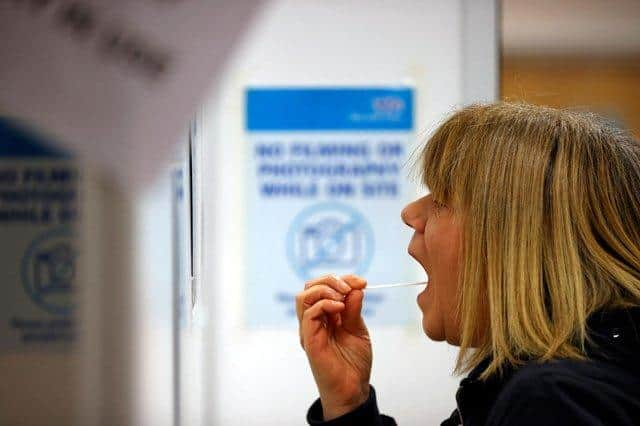Covid Sheffield: Delta ‘Plus’ variant accounts for one in eight Sheffield cases, study finds
and live on Freeview channel 276
The strain AY.4.2, nicknamed Delta ‘Plus’, is a ‘variant under investigation’ as of October 20 to reflect the possible risk that it could spread faster than the standard Delta strain.
There is no indication, however, that it leads to more serious illness.
Advertisement
Hide AdAdvertisement
Hide AdThere is also no evidence that the three Covid vaccines now in use in the UK – Astra Zeneca, Pfizer, and Moderna – are less effective against the new strain.


According to the Wellcome Sanger Institute, the figure in Sheffield amounted to 12.55 percent of the 271 cases studied during the same time span.
Out of 316 local authorities across the UK, Sheffield now ranks 18th in terms of the most severe Delta Plus instances.
Although regular Delta still accounts for most Covid infections in the UK, cases of Delta ‘Plus’, or AY.4.2, have been increasing.
Advertisement
Hide AdAdvertisement
Hide AdDespite the reported Delta ‘Plus’ cases, Sheffield’s overall positive cases fell during the week to November 6, compared with the previous seven days, according to data obtained from Public Health England.
A total of 1,807 cases were reported over the seven-day period, down by 484 cases or 21.1 per cent from the previous week, with an infection rate of 306.7 per 100,000 people.
The South East has highest rates of Delta Plus
Preliminary findings from the Wellcome Sanger Institute, one of the research bodies that works with the UK Health Security Agency (UKHSA), show potential hotspots.
It analysed more than 26,000 positive Covid-19 tests from the week to October 30.
Advertisement
Hide AdAdvertisement
Hide AdMid-Devon was found to have the highest proportion of Delta ‘Plus’ cases, at 42%, followed by Torridge in North Devon at 41% and Milton Keynes at 37%.
The research is provisional, but gives more detail than the official figures published by the UK Health Security Agency.
These official figures show Delta ‘Plus’ accounted for 11.3% of cases in England in the week to October 24.
The South East has England’s highest rates of Delta ‘Plus’, accounting for 19.5% of cases on October 25, according to the UKHSA.
'This pandemic is not over'
Advertisement
Hide AdAdvertisement
Hide AdDr Jenny Harries, the Chief Executive of the UK Health Security Agency, said: “Viruses mutate often and at random, and it is not unexpected that new variants will continue to arise as the pandemic goes on, particularly while the case rate remains high.
“It is testament to the diligence and scientific expertise of my colleagues at UKHSA, and the genomic sequencing capacity developed through the pandemic, that this new variant has been identified and analysed so quickly.
“However, it should serve as objective evidence that this pandemic is not over.
“The public health advice is the same for all current variants.
Advertisement
Hide AdAdvertisement
Hide Ad“Get vaccinated and, for those eligible, come forward for your third or booster dose as appropriate as soon as you are called.
“Continue to exercise caution. Wear a mask in crowded spaces and, when meeting people indoors, open windows and doors to ventilate the room.
“If you have symptoms, take a PCR test and isolate at home until you receive a negative result.”
